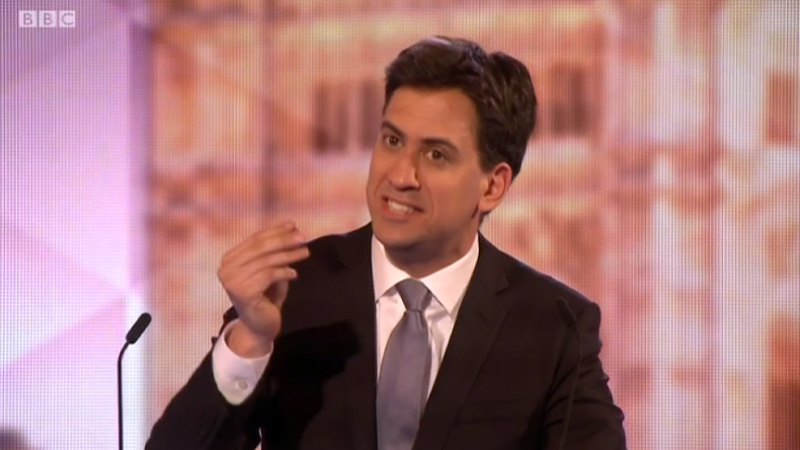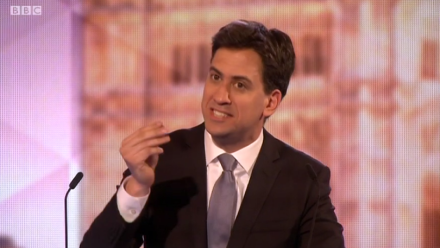
The general election is almost upon us and it looks like Ed Miliband is going use these final few days to put aside rumours about deals with the SNP and try to focus the public’s attention on the main issues facing the country.

In an interview with the Guardian, Miliband hit out at David Cameron and the Tories for focussing far too much on the SNP, by doing so he said the PM “has entirely withdrawn from the central issues facing the country…Cameron used to say the three letters that mattered to him most were NHS. Well, in this election campaign they have been replaced by SNP.”
Miliband again made it clear that Labour won’t “do a deal” or “go into coalition with” the SNP and said that the Tories’ dogmatic focus on this showed a desperate “bid to distract voters from the big choices they face over the next five years.”
The Labour leader argued vehemently against any kind of coalition or “deal” – all of which suggests that if Labour don’t win a majority (which they most likely won’t) but are the biggest party, he’d lead a minority government. To strengthen his case, Miliband pointed out that “this coalition has further undermined politics because it has made people feel [politicians] are just a bunch of scoundrels that break promises. If there is going to be a Labour government, it will implement a Labour programme.”
This is a point Miliband will continue to make in the coming days – particularly as this morning’s Telegraph reports that it has acquired a leaked SNP document, outlining how the party might work with Labour in a hung parliament.
Importantly, the document states: “We think coalitions and agreements are unlikely but we could work to support Labour on a case by case basis.”
This appears to be the first acceptance by either side that the parties could find common policy ground to work together on – and, as the Guardian interview clarifies, the Labour line remains that they would work as a minority government, with the pressure put on the SNP to support them or risk letting a Conservative Government back in.
However, there is little else of a revelatory nature in the rest of the document, with no real policy difference to what was put forward in the SNP manifesto.
Indeed, while talking to the Guardian, Miliband said the real issue of this election is not the SNP or a battle “between two nations”. Instead, drawing on a theme that has run throughout Labour’s election campaign – and which he talked about during his speech in Glasgow last night – he explained to the Guardian the election is a battle “between two sets of values – is the country run by an elite of the most rich and powerful or is it run for working people?”:
“The real risk at this election is not the Tory scare story about a Labour-SNP coalition – it is another five years of family finances hit, a doubling of the spending cuts next year with all that means for low pay, and insecurity being extended to more people. These next five days are both a verdict on the past five years and how we as a nation will lead our lives for the next five years.”
“The real risk is voting Conservative. They are desperate people who assumed they would coast to an election victory and now they realise it is a very closely fought and hard election.
“But [the Conservatives] still do not understand why it is so close. They don’t stand up for the things that the British people believe in and there is a mood for change in this country and a mood to get rid of this government.”
Miliband also didn’t shy away from the issue that was most focussed upon during the half an hour Question Time debate: the economy. He reiterated his argument that economic crisis was not brought about by Labour’s spending, while recognising the Tories’ tactic on this subject area:
“The debt and the deficit were lower at the crash than the ones we inherited. The real issue was that there was an unprecedented global financial crisis. You can take two views: the deficit caused the global financial crisis, or the global financial crisis caused the deficit. The reality is the latter. We should have better bank regulation.
“But this argument matters. The Tories want to fight the 2010 election and not the 2015 election. I am going into this election saying we are going to cut spending outside health and education, and the Tories want to prosecute this argument that you can simply cut your way to deficit reduction.”
He also spoke about his interview with Russell Brand – touching upon the issues of disenfranchisement that the two men spoke about earlier in the week:
“He approached us, and the reality is that ever since Russell Brand said that thing about not voting, people have said to me ‘Russell Brand is an idiot’. Well, I disagree with him about not voting, but in way there is no point shooting the messenger, because he has been sending a message about how many people view politics.
“Politics is so broken – one of the great unaddressed scandals of this election is that there are seven million not registered to vote – so I could not understand the idea that you do not reach out to someone that has articulated that message and who reaches people that are disengaged from politics.
“If there were more people like him, I would reach out to them too. I am going to take this anywhere. In a way it is old-politics new-politics, and frankly a bit of old media and new media. Do you go to where people are, or do you say ‘Sorry I am stuck in the Westminster game, and if you don’t want to join our game you can go jump in a lake’? I find it remarkable in a way that anyone says that is remarkable.
“I think he began the interview saying ever since the suffragettes nothing has really happened, and I said well hang on a minute – NHS, women’s rights, minimum wage and gay and lesbian rights.
“I don’t simply have a conventional political view about the way change happens. All the lessons of history show it is not just politicians that bring about change. Look at the biggest change in my lifetime: gay and lesbian rights. Tony Blair played a tremendous role in this, but he would say it was the movement that pushed for change. All of the big advances come from this confluence between people and politics. In a country where you have quite conservative institutions, it is this pressure, these movements, that bring about change. I think people want politics to be opened up, and if he endorses me that is fine, but I have got to admit sometimes that change is going to be hard. I think the public are not looking for pie-in-the-sky promises, or euphoria. I think they are in the mood for something quite gritty and realistic.”




More from LabourList
Scottish Labour leader Anas Sarwar to call on Starmer to resign
Two affiliated trade union leaders call on Starmer to resign as Prime Minister
‘Mor-gone but not forgotten’